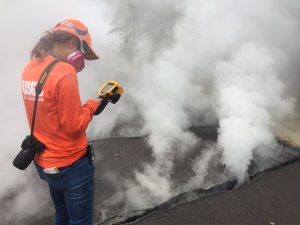Zivile Roditis has spent the last week anxiously watching the Kilauea volcano, belching and churning molten lava into her neighborhood in Leilani Estates.

Now experts fear Hawaii’s Kilauea volcano is at risk of explosive eruptions that could emit “ballistic projectiles,” the USGS says.
And concerns emerged that the lava could get near the Puna Geothermal Plant, where flammable liquids are stored, CNN affiliate Hawaii News Now reported.
“It’s really unreal,” Roditis told the affiliate this week. “Everybody just wants to hug. Thank goodness that everyone’s alive and safe.”
Hundreds of people have been evacuated in Roditis’ neighborhood, which is the ground zero of lava flow in Hawaii’s Big island. Lava from the Kilauea eruption has gobbled up streets, cars and homes, with at least 36 structures destroyed so far.
The Hawaiian Volcano Observatory measured a temperature of 103 degrees C (218 degrees F) at a crack in Leilani Estates on Wednesday. Temperatures were so high, it described the asphalt road as “mushy” from the heat.
The amount of land covered by lava is similar to about 100 football fields, the affiliate reported.
‘Ballistic projectiles’
The US Geological Survey on Wednesday warned of possible explosive eruptions in the coming weeks. That could happen because as lava continues to sink in a lake inside a Kilauea crater, an influx of groundwater could interact with the lava to create steam explosions.
Those forces would emit “ballistic projectiles” — as small as pebbles or weighing up to several tons. The agencies also said ash clouds would rise to greater elevations, dispensing ash over wider areas.
“At this time, we cannot say with certainty that explosive activity will occur, how large the explosions could be, or how long such explosive activity could continue,” an advisory said.
Hawaii Volcanoes National Park will close Friday due to the possibility of explosive steam at the summit of Kilauea volcano, according the National Park Service.
The Federal Aviation Administration issued temporary flight restrictions near Hilo due to the hazards from the volcano. The restriction ends Tuesday, according to the FAA.
“Only relief aircraft operations under direction of national park service are authorized in the airspace,” it said.
Disaster declaration
Gov. David Ige asked President Donald Trump to issue a disaster declaration for Hawaii.
The declaration would allow federal funds to flow to state and local efforts in Hawaii. The estimated cost to protect residents over the next 30 days is expected to exceed $2.9 million, according to the governor’s office.
A brief explosion Wednesday on a Kilauea crater was the result of falling rocks and not the interaction of lava with the water table, the USGS said.
Toxic gas
The Kilauea eruption last week created new volcanic vents on the ground miles east of the summit, releasing slow-moving lava and toxic gas into island communities.
Officials have warned of dangerous levels of sulfur dioxide gas.
If winds weaken, that gas and other volcanic pollutants can settle easily with moisture and dust to create a haze called volcanic smog, or “vog,” with tiny sulfuric acid droplets that can pose respiratory problems, according to the US Geological Survey.
Winds and new cracks
Trade winds could weaken Thursday and Friday, meaning the vog that’s largely been accumulating over the ocean south of the Big Island could pool over a larger portion of it, creating possible health hazards, the National Weather Service says.
At higher concentrations, vog can cause headaches and irritation to the lungs and eyes, the University of Hawaii at Hilo says.
If trade winds become lighter as predicted later this week, vog could pool northward over parts of the island by Friday, the weather service says.
Other dangers persist, not only in the form of lava but also earthquakes and newly formed cracks.
The 13th and 14th vent erupted Tuesday in the Leilani Estates area, where roughly 1,700 residents were asked to evacuate last week. At least 36 structures — including at least 26 homes — have been destroyed.
On Wednesday, a 15th vent formed — this one in the Lanipuna subdivision, the Hawaii County Civil Defense Agency says.





















